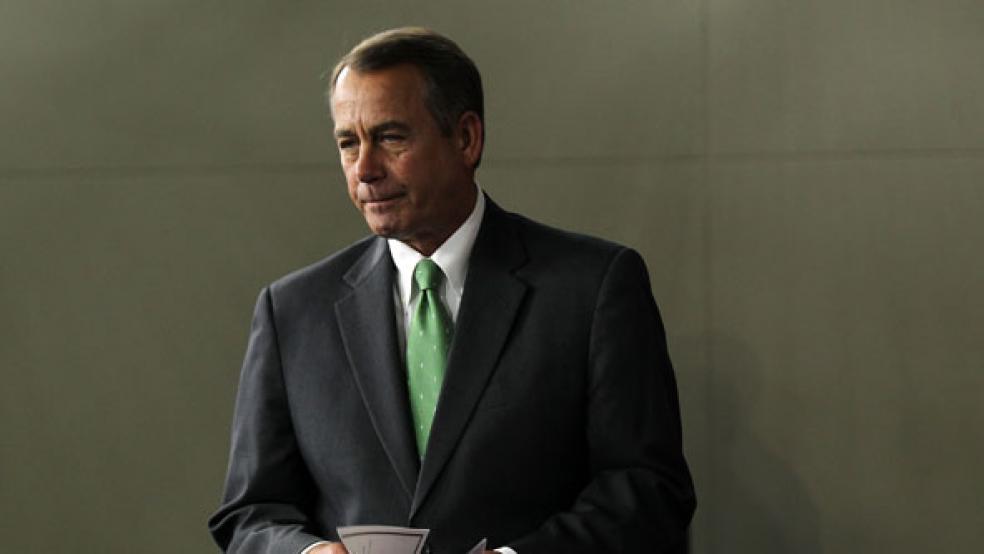House Republicans and President Obama are turning the debate on spending cuts and deficit reduction into a Wild West showdown, except phrases like “veto power” and “government shutdown” are being sprayed between the two parties in lieu of bullets.
Metaphorically speaking, however, Obama appears to have more fire power. With no budget yet enacted for the current fiscal year, he is threatening to veto any continuing resolution bill to fund the government until September 30 “that undermines critical priorities or national security through funding levels or restrictions, contains earmarks, or curtails the drivers of long-term economic growth and job creation while continuing to burden future generations with deficits,” according to a statement from the Office of Management and Budget Tuesday. In other words, Obama stands poised to repudiate House Republicans’ $100 billion spending cut pledge, warning steep cuts nearly half way through the fiscal year would have a devastating impact and further stymie economic growth.
Some of the Republican budget cut proposals also spill into 2012, cuts that interfere directly with some Obama initiatives such as investments in high speed rail, and cutbacks to the Environmental Protection Agency.
“Republicans will not punt,” House Speaker John Boehner, said at a news conference at the Republican National Committee Tuesday. “Everything's on the table. Over the last two years, since President Obama has taken office, the federal government has added 200,000 new federal jobs. And if some of those jobs are lost in this, so be it.”
House Appropriations Committee Chairman Rep. Hal Rogers, R-Ky., introduced the spending bill late last Friday night .It provides $1.029 trillion in non-security discretionary funding for fiscal year 2011,. $61 billion (or 15 percent) less than 2010 spending levels and $100 billion (or 19.4 percent) less than the President’s 2011 proposed budget, which was never enacted.
Broken down, the $100 billion in cuts are: $81 billion from non-security programs and $19 billion from security-related programs. The bill also would eliminate any unobligated funds from the stimulus law funds and end funding for AmeriCorps and the Corporation for Public Broadcasting. Still, non-security discretionary funding amounts to a small slice—approximately 15 percent—of the overall federal budget.
Meanwhile, the GOP plan clashes with the President’s proposed investment in high speed rail programs. It would cut $1 billion from rail transportation, while the President has proposed a six-year, $53 billion investment in a national high-speed rail network. The President also proposed to shave the EPA budget by $1.3 billion, yet the GOP looks to slash nearly 30 percent, or $2.7 billion.
Republicans have vowed the continuing resolution represents the first of many cuts aimed at trimming the budget this year to achieve fast deficit slashing. They claim there are no earmarks in the bill, upholding their self-imposed earmark ban, which Democrats later endorsed. But amid all the cuts, there is a provision to spend millions on an alternate engine for the F-35 Joint Strike Fighter in the Pentagon’s $515 billion budget. Keeping the alternate engine would add approximately $450 million to the budget.
With more than 400 pending amendments to the bill, debate is expected to last three days[, according to aides on the Hill. House leadership intends to pass the measure by Thursday, before going on recess.
The House Republican plan will likely be met with strong opposition from Senate Democrats, who control that chamber and say the plan is dead on arrival. Republicans and Democrats agree spending cuts are necessary to reduce the deficit, which is expected to soar to $1.6 trillion this year, but don’t see eye to eye on how to achieve a reduction plan.
“Many of the reductions proposed by the House were made not because programs were ineffective or wasteful, but out of desire to meet an arbitrary dollar figure cited during a political campaign,” Senate Appropriations Committee Chairman Daniel Inouye, D-HI., said in a statement. “Many of the recommendations in this bill resulted from a ‘meat cleaver’ approach to the budget cuts, when we should be using a scalpel—responsibly identifying specific programs that are wasteful or unneeded.”
Senate Republicans have pledged their support for the House plan but may not wholly endorse it.
"We're going to try to achieve the same reduction in total that we hope will be achieved on the House side later this week," Sen. Mitch McConnell, R-Ky., told reporters Tuesday. "We'll see whether the Senate wants to establish different priorities."
If an agreement isn’t reached by both houses before a March 4 deadline, Congress can pass a series of extended resolutions or face the possibility of government shutdown. While both parties have repeatedly stressed they want to avoid a shutdown, intra-party fights, escalated rhetoric and pressure from the Tea Party has heightened the likelihood occurring.
Related Links
Obama Warns Spending Cuts Could Hurt U.S. Recovery (Yahoo News)
House Begins Debate on $161B in Spending Cuts (USA Today)
US House Begins Debate on Fiscal 2011 Spending Cuts (The Wall Street Journal)





